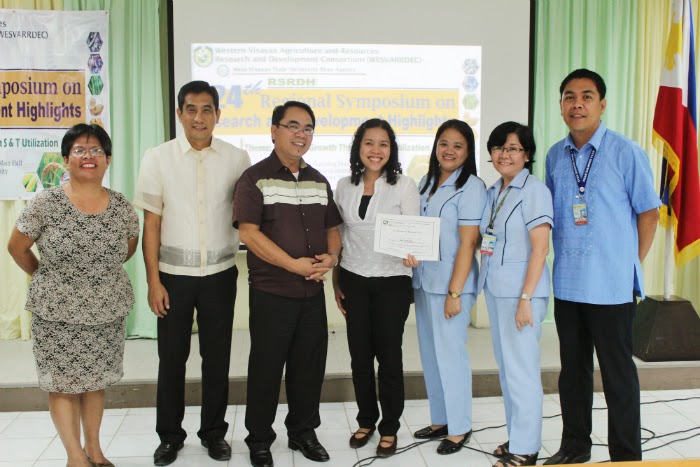Central Philippine University shines in 24th RSRDH
  |
The CPU research team headed by Prof. Mizpah C. Villalobos with RRDG Coordinator Dr. Greta Gabinete, Consortium Director Dr. Noeni S. Nepomuceno, and RRDCC Chair Dr. Danilo Abayon (from extreme left)
Central Philippine University (CPU) emerged as the big winner during the recently concluded 24th Regional Symposium on Research and Development Highlights held at the Center for Teaching Excellence in West Visayas State University. The RSRDH is an annual research competition organized by WESVARRDEC that showcases and recognizes the best research outputs in the agriculture, aquatic and natural resources sector. The activity is sponsored in part by the Grants-in-Aid (GIA) Program of the Department of Science and technology Regional Office VI.
CPU's research entries "Antioxidant Activity and Citral Content of Lemongrass Tea" and "Formulation, Package Development and Shelf-Life Testing of Lemongrass Ready-to-Drink Beverage Products" respectively won the Best Paper award in the Natural/Biological Research and Developmental/Technological Research Category.
CPU's entry in the natural/biological category bested 17 entries from consortium member agencies throughout Western Visayas. The study compared the antioxidant activity and citral content of various developed lemongrass formulations. Meanwhile CPU's entry in the developmental/technological research category which bested 7 other entries aimed to formulate and package good tasting beverage products containing high amounts of antioxidant and citral content and subject these to shelf-life studies.
Meanwhile, Capiz State University's entry "Price Dynamics and Volatility Spill-Over Effects In Farm-Retail Price Relationships of Chicken and Pork, 1990-2013 won the Best Paper award in the social science research category. This time-series study investigated causality using Granger causation, co-integration and volatility spillover effects (“heat waves” and “meteor shower” effects) between producer and consumer prices of chicken and pork markets in the Philippines, using the methodology of the Generalized Autoregressive Conditional Heteroscedastic (GARCH).
